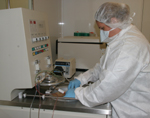New clean lab designed for cell
processing
by Megan FinkPublic Relations
A new center has opened this week enabling researchers to create biologic therapies, such as antibodies, vaccines, and cellular products, to provide patients with innovative treatment options.
The new Center for Cellular Therapy (CCT) in the Clinical Sciences Building will function within the General Clinic Research Center as a viable environment for cell processing, gene therapy and the evaluation of responses to therapy.
 Gina Scurti,
research specialist III, assembles the cell-processing centrifuge
located in the one of three, class-100 labs. This specialized piece of
equipment separates cells of different densities while spinning at a
high speed.
Gina Scurti,
research specialist III, assembles the cell-processing centrifuge
located in the one of three, class-100 labs. This specialized piece of
equipment separates cells of different densities while spinning at a
high speed. Cellular capabilities within the lab will include the isolation, expansion, reproduction, and genetic modification of these cellular products.
A special air-flow system and air-handling units leave the lab almost particle free. An unfiltered room could contain billions of particles floating in the air, while a facility like the CCT allows no more than 100 particles per cubic meter in its three interior labs; a class-100 designation. The adjoining hallway is class- 1000 and the entrance and exit rooms are considered class-10,000. This filtration prevents spores, dust mites, mold, bacteria, pollen, and viruses to enter the facility and ultimately compromise the products being crafted for patients.
Michael Nishimura, Ph.D., head of Hollings Cancer Center's Cancer Immunology and Immunotherapy program, will utilize the lab to pursue the use of genetically modified cells for cancer patients. Nishimura developed a novel approach for genetically modifying a patient’s own lymphocytes so they can recognize their malignancies. This will provide patients with a source of their own immune cells capable of treating their cancer.
A dendritic-cell trial, led by David Cole, M.D., CCT medical director and chairman of surgery, is a collaborative effort with Duke University to isolate dendritic cells, which are part of the body’s immune system. Researchers have found that dendritic cells loaded with a protein such as carcinogenic embryonic antigen (CEA) activate the immune system against the CEA expressed by some cancers. The procedure is a therapeutic and experimental vaccine trial already approved by the Food and Drug Administration and MUSC’s Institutional Review Board, said Nishimura.
The center also will allow the Digestive Disease Center (DDC) to transplant insulin-producing cells called pancreatic islets.
Katherine Morgan, M.D., Department of Surgery assistant professor, is the medical director of the Islet Transplantation Program for patients with chronic pancreatitis. In the new facility, Morgan can remove the dysfunctional portion of the pancreas and isolate insulin-producing cells. The detached islets are returned to the patient to prevent the development of diabetes, which is a common development when insulin production is suspended.
“I am very excited about the opening of the lab and the opportunity to offer new therapies to patients with chronic pancreatitis,” Morgan said. “We will now be able to offer surgery to patients that we previously were not able to operate on due to the high risk of morbidity from the development of brittle diabetes; with a very high success rate for pain relief.”
Friday, Oct. 12, 2007
Catalyst Online is published weekly,
updated
as needed and improved from time to time by the MUSC Office of Public
Relations
for the faculty, employees and students of the Medical University of
South
Carolina. Catalyst Online editor, Kim Draughn, can be reached at
792-4107
or by email, catalyst@musc.edu. Editorial copy can be submitted to
Catalyst
Online and to The Catalyst in print by fax, 792-6723, or by email to
catalyst@musc.edu. To place an ad in The Catalyst hardcopy, call Island
Publications at 849-1778, ext. 201.